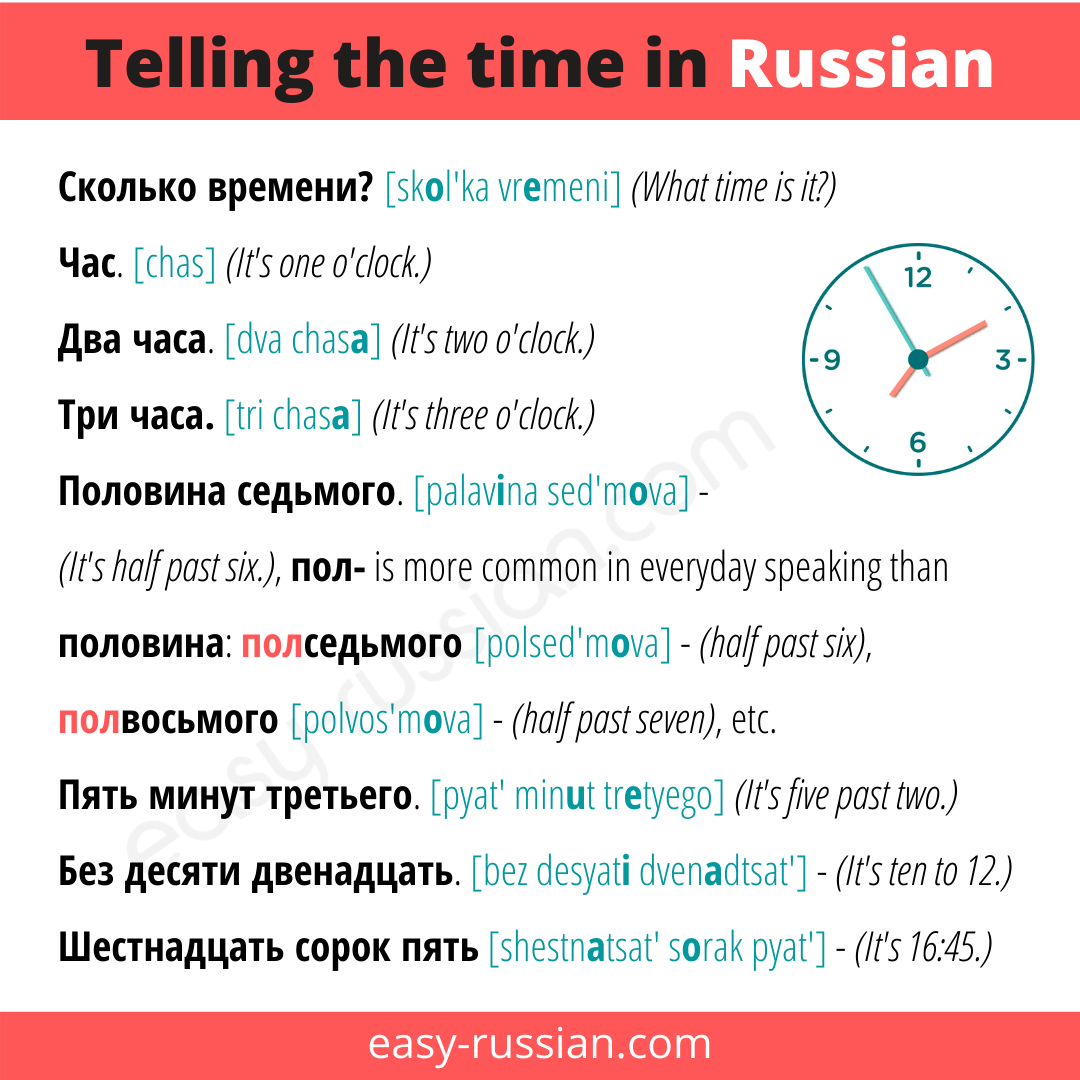Telling the time in Russian: how to do it right
This post is about a basic topic – asking and telling the time. Imagine, you are alone in some Russian city and you don’t have a watch or a mobile phone (I know it’s hard to imagine but who knows what can happen) and you need to be in a particular place at a particular time. You’ll probably need to ask people around what time it is. But this is not the only case, of course. When talking to a friend you can also need tot ask or tell the time. Just while walking the street, someone may ask you about time.
Anyway, if you don’t really want to lose your time, watch the video first. It will help you understand some basic conceptions. If it is to difficult for you, go back to the text version below.
Asking the time in Russian: two simple questions
There are two ways of asking time in Russian. The most common is “Сколько времени?” [skol’ka vremeni]. Uneducated people may say “Сколько время?” [skol’ka vremya], it is very common in everyday speaking but not grammatically correct because the word время (time) should be used in the genitive case – времени. We literally ask “how much”, when asking the time.
The second question is “Который час?” [katoriy chas], which sounds more formal to me. I rarely hear people saying this. Usually they use the first phrase.
If you want to ask passers-by what time is it, you can use following patterns:
Извините, пожалуйста, вы не подскажете, который час?
[izvinite pazhalusta vi ne padskazhete katoriy chas]
Excuse me, please, can you tell me what time is it?
Простите, вы подскажете, сколько сейчас времени?
[prastite vi ne padskazhete skol’ka sechas vremeni]
Excuse me, can you tell me what time is it now?
How to tell the time in Russian
Well, this will be much harder than asking the time. First of all, you need to be familiar with Russian cardinal and ordinal numerals. If you’re not, just follow the link.

So, if it’s one, two, three, etc. o’clock (sharp), it’s very easy:
– Сколько времени? (What time is it?)
Час. (It’s one o’clock)
Два часа. (It’s two o’clock)
Три часа. (It’s three o’clock)
Четыре часа. (It’s four o’clock)
Пять часов. (It’s five o’clock)
Шесть часов. (It’s six o’clock)
Семь часов. (It’s seven o’clock)
Восемь часов. (It’s eight o’clock)
Девять часов. (It’s nine o’clock)
Десять часов. (It’s 10 o’clock)
Одиннадцать часов. (It’s 11 o’clock)
Двенадцать часов. (It’s 12 o’clock)

We can also tell the time exactly as we see it on the clock. In this case it’s also easy if you are familiar with the Russian numbers:
– Сколько времени?
– Шесть сорок пять. (6:45) or восемнадцать сорок пять (18:45).
In the first case (шесть сорок пять) we can mean both 6:45 and 18:45. We don’t need to clarify this if the part of the day is obvious.

In the following situations the part of the day is essential:
– Когда будет трансляция? (When will it be broadcasted?)
– В 11 вечера. (At 11 pm).
– Когда мне позвонить? (When should I call?)
– В девять утра. (At nine am.)
Not that hard, right? Until now it was. Let’s get to the most dificult part.
How to deal with halves, quarters and minutes
When it’s half past something, we use the word половина and put an ordinal number after it.
Половина второго. – It’s half past one. (Note that we use the genitive form here.)
Половина третьего. – It’s half past two.
Половина десятого. – It’s half past nine.

Have you noticed something weird? The russian numbers seem to be one less than the english ones. Yeah, it’s one crazy thing you should remember.
When we talk about minutes past and to something, it gets even more comlicated. Look at the examples:
Двадцать минут второго. – It’s 20 minutes past one.
Пятнадцать минут шестого. – It’s 15 past five.
Пять минут десятого. – It’s 5 past ten.

Again, the first numbers in this case are equal in both english and russian sentences, but the second ones are diferent. Why it happens? We talk about time from other perspectives. But in the next situation we are thinking the same way.
Без десяти восемь. – It’s 10 to eight.
Без пятнадцати двенадцать. – It’s 15 to 12.
Без пяти шесть. – It’s 10 to six.
Now we finally match. The preposition без means without. So, it’s almost eight (in the first example), only without 10.
That’s it. If you have any questions, just leave a comment.
